


Chapter Fifteen:
Show Trial, Soft Time
The first period of the national revolution is over. It has brought the desired clearing [of the air]. Our highly revered Fuehrer, Adolf Hitler, has again bled for the German people. The most shameful treachery that the world has ever seen has victimized him and the German people. Through Hitler's blood, and the steel directed against our comrades in Munich by the hands of traitors, the patriotic Battle Leagues are welded together for better or worse. The second phase of the national revolution begins. 1
The above propaganda release cannot have done much to raise the shattered spirits of the radical Right in Munich. One supposes that it had even less effect on those sitting behind bars. Völkisch writer Arthur Moller van den Bruck wrote of the despair and hopelessness of the National Right in the wake of the abortive putsch:
There are many things that can be said against Hitler. But one thing one will always be able to say: he was a fanatic for Germany . . . . Hitler was wrecked by his proletarian primitivism. He did not understand how to give his National Socialism any intellectual basis. He was passion incarnate, but entirely without measure or sense of proportion . . . .
Our history has gone astray. Nothing of ours is succeeding in the world. Nothing today; nothing yesterday. Nothing—if we think back—nothing for the last generation . . . . Our cause was still-born from the start . . . . Something has gone wrong with everything. And when we try to set anything aright, it breaks to pieces . . . . An evil spell hangs over the Reich." 2
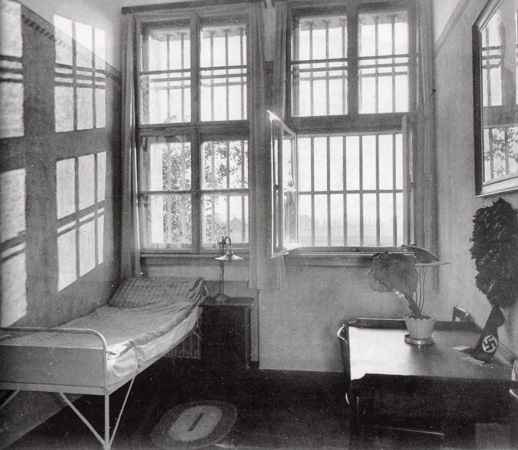
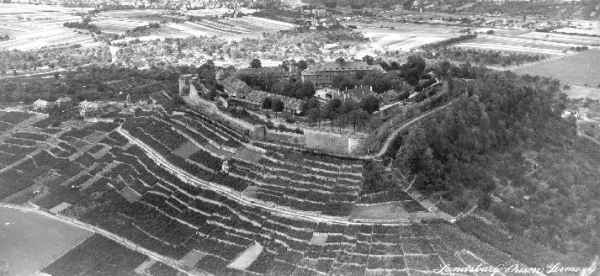
It remains unspoiled to this day, one of the most beautiful survivals of the Middle Ages in Germany. The houses have preserved their old-world character. Modem times have failed to make any impression upon Landsberg: the little old town might have fallen asleep five hundred years ago, and never since waked up. 3
The Landsberg Prison (Gefangenenanstalt und Festungshaftanstalt Landsberg) was built in 1909. Surrounded on all sides by tall, stone walls, the complex of buildings within encompassed two main facilities; accommodations for common criminals, and a fortress (Festung) section for political prisoners. 4Hitler explains his entire world view, details his deals with Kahr, Lossow, and all his other collaborators, and happily admits to an entire range of criminal acts, including treason. By the time he has finished, nearly twelve hours later, it is early evening. Ehard, who has an almost photographic memory, works through the night, writing down everything that Hitler had told him during "the illuminating interview." By the morning of the 13th, he is heading back to Munich. 9
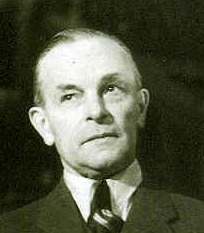
Here's a thing that's possible only in Germany. My present Minister of Justice is the very man who, in his capacity of Bavarian Minister, had me imprisoned in Landsberg. The former director of that prison has become the head of Bavaria's penitentiary services. At the time, I'd given my men orders not to leave a prison without first having converted the whole prison staff to National Socialism. The wife of the director of Landsberg became a fervent devotee of the movement. Almost all her sons belonged to the "Oberland" Free Corps. As for the father—who was not entitled to have an opinion!—it seemed to him reasonable, at the time when he was obliged to rage against me, to spend his nights in the prison, to shelter from household quarrels. None of the guards was offensive in his attitude towards us. 10
1923 November 14 Having spent the entire day previous without eating, Hitler continues his fast by embarking on a hunger strike. The strike is said to have lasted for at least two weeks, which is almost certainly an exaggeration. 11During moments of great crises, Adolf Hitler was prone to falling into deep depressions, punctuated by threats of suicide. While it is tempting to dismiss such antics as mere affectations, it is nonetheless noteworthy that Hitler, ultimately, will prove well able to commit such an act.
His first notable depression, perhaps not surprisingly, came after the death of his mother. While it is, of course, natural and expected to mourn the death of a parent, it is less so when normal sadness becomes prolonged depression. The Hitler family doctor wrote that he had never, in his long career, seen a family member so overcome with grief as was Hitler, though there is no mention of suicide threats. His depression over his mother's demise lasted for months, and reportedly came back to him every year around the anniversary of her death, which was a few days before Christmas. Thirty-plus years later, witnesses will report that he was still, in no way, "over it".
Failing the entrance exam to art school, for the second time, was an example of natural disappointment morphing into deep depression. This failure affected him to such an extent that he abandoned his only friend, without explanation, and ultimately allowed himself to become homeless, and dependent upon charity for food and housing. Having staked his future on becoming a "great artist", the resultant loss of self-esteem proved more than he could handle, and his escape to the anonymity of the streets reflected that. This self-inflicted loss of status is a classic sign of clinical depression, and can be seen as a suicide, of sorts, of one's viability as a member of society.
After the signing of the Armistice that ended the Great War, Hitler, recovering from the effects of a battlefield poison gas attack in a Red Cross hospital, experienced his first full-blown clinical depression, which was accompanied by hallucinations and a loss of sight. He tells us that he contemplated suicide many times during these weeks, and it seems likely that he was in no way exaggerating. He had been making a very good recovery until word of the Armistice reached him. His time in the hospital was likely doubled by the "relapse" he suffered after hearing the devastating news.
The failure of the Hitler Putsch, and Hitler's subsequent incarceration, brings about what is, arguably, Hitler's fourth Great Depression. Alois Maria Ott, the prison psychologist, much later recalled that Hitler said to him: "I've had enough. I'm finished. If I had a revolver, I would take it." Ott tells us that it was he who convinces Hitler to give up the hunger strike after a few hours of discussion. 12
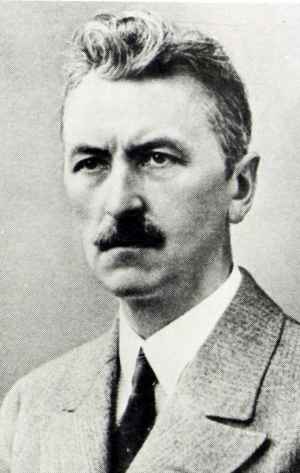
Her advice turned the scale. Hitler had a great admiration for her and his whole appearance at Uffing after the putsch must have been part of some subconscious urge to turn for succor to this woman, who corresponded so closely to his repressed yearnings. 15
1923 Late November Anton Drexler, the founder of Hitler's party, has been arrested and incarcerated in Landsberg, along with many others who may or may not be charged in connection with the putsch. Drexler finds a listless and suicidal Hitler: "I found him sitting like a frozen thing at the barred window of his cell." Dr. Brinsteiner, the prison physician, tells Drexler that Hitler has not eaten for approximately two weeks. Drexler tries to reason with him:I said he'd no right to give up all for lost, however bad things seemed. The party would look to him to start it all up again someday. But I couldn't make any impression. He was utterly in despair, so I nearly fell into despair myself, but at last I said how we'd all rather die than go on without him.
Before leaving the cell, Drexler spends nearly two hours convincing Hitler to continue the fight, and is convinced that he has been instrumental in getting his Fuehrer past a personal crisis. 16Never in my life will I forget this hour. I spoke with him for half an hour. His spirit and soul were again at a high level. Physically he is quite well. His arm still gives him trouble, but they think it is almost healed. How moving is the loyalty he is accorded these days. Just before me, for example, a count visited him and brought a Christmas package from the Villa Wahnfried from B. That which he has accomplished is as solid as a rock. The goal and the victory is only a question of time. God grant it be soon. 19
1923 December 8 Carin Göring writes her sister from Innsbruck hospital in Austria, where her husband Hermann is laid up from wounds received during the putsch:The wound is nothing but pus over the whole thigh. It hurts so much he lies there and bites the pillow, and all I can hear are inarticulate groans . . . . Today is just a month since they shot at him, and though they are giving him morphine every day now it does nothing to diminish the pain. 20
1923 December 8 The Reichstag passes enabling legislation to allow Chancellor Marx to govern by emergency decree. 21
The artists in the Hitler movement planned to celebrate Christmas at the Blute Cafe in the Blutestrasse with a tableau vivant, entitled, "Adolf Hitler in prison." I was given the task of finding a suitable double for Hitler. As it happened I came across a man who bore a most striking resemblance to him. I asked him if he would take part in this tableau vivant, and he agreed to do so.
The great hall of the Blute Cafe was filled with people. A reverent hush fell as the curtain went up and a prison cell became visible on the half-darkened stage. Behind the small barred window, snowflakes could be seen falling. At a small table, his back to the audience, his face buried in his hands, sat a man. An invisible male choir sang, "Stille Nacht, heilige Nacht."
As the strains of the last note died away, a tiny angel came into the cell, carrying an illuminated Christmas tree, which was placed gently on the table of the lonely man. Slowly "Hitler" turned until he was face to face with the audience. Many thought that it was indeed Hitler himself, and a half-sob went through the hall. The lights went up, and all around me I saw men and women with moist eyes, handkerchiefs hastily disappearing. 24
And just think, Mr. Governor, what prospects such a measure would afford for economic collaboration between Great Britain's world empire, and Germany. If we desire to establish European peace, we must free ourselves from the limitations imposed by mere conference resolutions and Declarations of Congress. Economically, the European countries must be more closely linked.
Schacht will receive agreement on his terms within a matter of days. As a consequence, economic disaster is averted as inflation slows and the economy of Germany begins to improve. 26First expressing my heartiest thanks for your representation of the movement in Italy, I ask you to solicit in the interest of the Germany Liberty Movement in North America, and especially to assemble financial means for it. I ask you to receive these means personally, and, if possible, to bring them over in person. 28
1924 January 8 Dr. Brinsteiner, the prison physician, files a report on Landsberg's famous putschist. He declares Hitler fit to stand trial: "Hitler was at all times in control of himself; and his will and his mental capacity were not impaired by any illness, even if the aims and purposes of the Putsch are interpreted as being faulty. " 29Franz Gürtner, the Bavarian Minister of Justice, is a Nazi sympathizer who is working behind the scenes to assist Hitler and his fellow defendants. While many of those who had taken part in the putsch had escaped the authorities, more than one hundred men had been detained. Of these one hundred, ten are chosen by Gütner to stand trial. Erich Ludendorff is listed first in the indictment, followed by Adolf Hitler, "the soul of the entire enterprise." 38
Ernst Pöhner, Munich's former Chief of Police, who had been slotted to be Bavaria's prime minister under the Putsch regime, is the highest placed government official among the defendants. Wilhelm Frick, the former chief of the political division of the Munich police, rounds out the civilian police representatives of the Putsch. Three commanders of various troop formations are indicted, Ernst Röhm of the Reichskriegsflagge, Friedrich Weber of the Oberland Bund, and Hermann Kriebel, who had commanded the Kampfbund, a combined force made up of Oberland Bund, Nazi SS, and Reichskriegsflagge units. Three SS storm troopers, Wilhelm Brückner, Adolf Wagner, and Heinz Pernet, Ludendorff's stepson, fill out the list of defendants. 34

All the defendants are charged with high treason. The trial is presided over by two professional judges, and three "people's court" judges: two insurance salesmen, and the proprietor of a stationery store. The trial will total 24 days of testimony and argument. The chief prosecutor is Ludwig Stenglein, assisted by Hans Erhard and Martin Jerseys. The Presiding Judge is Georg Neithardt, who had been the judge at Hitler's first trial in January of 1922. Then, Hitler had been found guilty of criminal defamation stemming from a physical attack on a political opponent. During the current trial, Judge Neithardt will allow Hitler to speak at length, question witnesses, and interrupt testimony with interjections at will. It is Hitler who will, by default, control the tenor and tempo of the trial. 36
All of the judges treat Ludendorff with the greatest deference throughout the trial. G. Ward Price, the famous English correspondent, wrote that Ludendorff would "bark at the court in Kommandostimme, the tone of the parade ground, every syllable clipped harsh, and when his imperious voice rose, the little Chief Justice in the middle of the bench would quiver until his white goatee would flicker so badly he had to seize it to keep it quiet." 37
At the Residenz, we were held up by a strong cordon of police. We were in civilian clothes, and not one of us had so much as a revolver in his hand. There came a rifle shot and then a salvo. Scheubner fell and pulled me down, and I had the feeling I had received a flesh wound. I tried to get up. The shooting stopped. All around me I saw nothing but dead men. On the ground lay a tall man streaming with blood. He wore a dark coat, and I was sure it was Ludendorff. 40
In his most passionate tone, clenching his fist in emotion, he declares: "I alone bear the responsibility. If today I stand here as a revolutionary, it is as a revolutionary against the revolution." 41
While we at the front still believed in absolute obedience at that time, it was practically nonexistent in the field hospitals. I was reading a book on military science in the hospital, when the head doctor slammed the book shut and took it from me. Afterward a Dr. Stettiner asked me, "What are you reading here? I thought you were smarter than that." I was completely dumbfounded. Of course, Dr. Stettiner was a Jew . . . .
And so it becomes possible that a German considers his own blood brother a mortal enemy while he considers a racial alien—let us say a Hottentot—his brother . . . .
Either Marxism will poison the people, or this poison will be bled off. Then Germany can recover, but not before. As far as we're concerned, Germany will be rescued when the last Marxist has been converted or annihilated.
France's objective is to reduce Germany to a number of small states . . . .
Policy is made not with the palm branch, but with the sword. 42
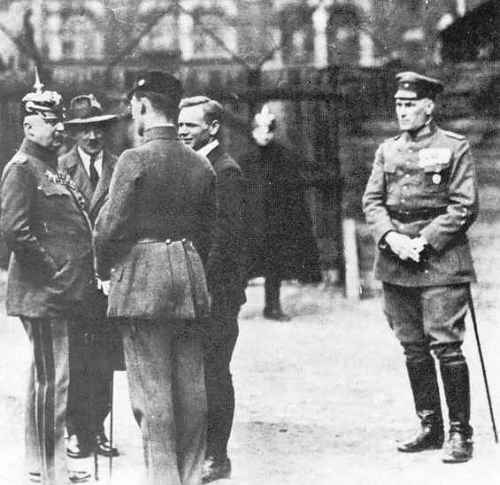
How small are the thoughts of small men! Believe me, I do not regard the acquisition of a minister's portfolio as a thing worth striving for. I do not hold it worthy of a great man to endeavor to go down in history just by becoming a minister. One might run the risk of being buried beside other ministers. My aim, from the very first day, was a thousand times greater than becoming a minister. I wanted to become the destroyer of Marxism. I wanted to solve this task, and if I succeeded, then the title of minister would have been, as far as I was concerned, a rank absurdity.
When I stood beside the grave of Richard Wagner for the first time, my heart flowed over with pride at the thought that a man rested here of whom it was forbidden to write: "Here rests Privy Councilor, Music Director, His Excellency Baron Richard Wagner." I was proud that this man and so many men in German history were content to hand down their names to posterity, without any titles. It was not from modesty that I wished at that time to be a drummer. This was my highest aspiration. The rest is but a trifle . . . .
My standpoint is that a bird must sing because he is a bird, and a man who is born for politics must engage in politics whether he is free or in prison, whether he is sitting in a silken chair or contents himself with a hard bench. The fate of his people will absorb him from early morning to late at night. Von Kahr may even become a dictator one day. I ask that two of his phrases be remembered. He said he certainly did not want to become a dictator, but he could be compelled. A second statement of his was that he had not pushed himself forward, but had been compelled.
The man who is born to be a dictator is not compelled; he wills it; he is not driven forward; he drives himself forward. There is nothing immodest in him. Is it immodest for a laborer to drive himself to hard work? Is it presumptuous of a man with the high forehead of a thinker to meditate until at last he offers his intellectual discoveries to mankind? A man who feels called upon to govern a people has no right to say: If you need me or call for me, I will go with you. No, he has the duty to step forward.
Do you imagine that von Kahr is our German Scharnhorst, Yorck, or Gneisenau, or the Freiherr von Stein who, his heart seething with hatred, cried out: "I shall destroy Napoleon!" What I missed in von Kahr was precisely those characteristics which in my eyes make a great man . . . .
The putsch of November 8 did not fail. Yet it might very well have failed if some mother had come and said to me, "Herr Hitler, you have my child on your conscience." But I can give you my assurance on this. No mother came to me. On the contrary, thousands more came and joined our ranks. Of the young men who fell, may it be said: "They too died for the Fatherland." Therein lies the visible sign of the triumph of November 8—our youth in their full flood-tide aroused themselves and fought together. This is the achievement of November 8, which did not bring us to a pit of misery, but on the contrary raised the people to the highest pitch of enthusiasm. I believe that the hour will come when the masses who stand today in the streets under our swastika flag will unite with those who fired at us on November 8. When I heard that it was the Green Police who did the shooting, I was happy that it was not the Reichswehr that had besmirched its honor; the honor of the Reichswehr remains untarnished. The day will come when the Reichswehr will stand by our side, officers and men . . . .
The army we have formed is growing from day to day, from hour to hour, and faster. Especially in these days, I nourish the proud hope that one day the hour will come when those rough companies will grow to battalions, the battalions to regiments, the regiments to divisions, and the old cockade will be taken out of the filth, and the old flag will wave again, and there will be a reconciliation at the Last Judgment, which we are prepared to face. Then will the voice of the real Court of Justice speak from our bones and our graves. For it is not you, gentlemen, who pronounce judgment upon us. Instead, the judgment of the eternal court of history will pronounce against this prosecution which has been raised against us. As for your verdict—I know it already. The eternal court will not ask us: "Did you commit high treason, or not?" That court will judge us, the Quartermaster-General of the old Army, his officers and soldiers, as Germans who wanted the good of their own people and Fatherland, who wanted to fight and die. You may judge us guilty a thousand times over, but the Goddess of Eternal Justice will smile and tear to tatters the brief of the state's attorney and the verdict of this court. For she acquits us!
The court has also become convinced that the motives of the defendants were genuinely patriotic, noble, and selfless. [They] believed most conscientiously that they had to act in order to save the Fatherland. They thought they were complying with the earlier intentions of [the triumvirate]. This does not justify their plans, but it does provide the key to understanding their actions. 51
Hitler's worst fear was that he would be deported to Austria under the Protection of the Republic Act. This did not happen, and the court explains its reasoning in this regard:Hitler is a German-Austrian. He considers himself to be a German. In the opinion of the court, the meaning and intention of the terms of section 9, para II of the Law for the Protection of the Republic cannot apply to a man who thinks and feels as German as Hitler, who voluntarily served for four and a half years in the German army at war, who attained high military honors through outstanding bravery in the face of the enemy, was wounded, suffered other damage to his health, and was released from the military into the control of the District Command Munich I. 52
The light sentences are the work of Bavarian Minister of Justice Franz Gürtner, who will become Minister of Justice in Hitler's cabinet in 1933; a post he will retain until his death in 1941. The slap-on-the-wrist sentences do not go by unnoticed by the Berliner Tageblatt: "Never before has a court more openly denied the foundation upon which it rests and upon which every modern state is built." 53I never can think without melancholy and bitterness about this monstrous trial. What went on there reminded me of a Munich political carnival. A court which time after time gave the accused the opportunity to make lengthy propaganda speeches; a lay judge who after Hitler's first speech, declared (I heard it myself), "But he's a colossal fellow, this man Hitler"; a presiding judge who let one man ridicule the highest officials in the Reich . . . an officer who shouted to an American journalist who was chatting in English with a colleague, "speak German in my presence!"; a presiding judge who banished a newspaper cartoonist from the courtroom because one of the accused felt that he had been the subject of a cartoon—doesn't all this belong in the Munich picture book of a great political carnival? 54
The Times (London) remarked: "The trial has, at any rate, proved that a plot against the Constitution of the Reich is not considered a serious crime in Bavaria." 55Herr Hitler is of the view that, after parliament was entered against his will, participation in parliament has to be seen as one of many methods of combating the present system, including parliamentarism. But participation should not be "positive cooperation", as was unfortunately carried out by the Völkisch parliamentarians with very little success, but only be through the fiercest opposition and obstruction, through constant criticism of the existing system in parliament. Parliament, or better still parliamentarism, should be taken to absurdity in parliament. 58
However, after this electoral success, he begins to see that it may be a viable path forward to participate in this distasteful "parliamentarism" business., and he does not protest when his name is put forward. Meanwhile, various post-putsch groupings have been playing for position, and many mergers are proposed. Hitler sends an occasional suggestion, and answers queries addressed to him, but "the movement" itself has Ludendorff as its nominal head. Hitler will find the scene in total disarray upon his eventual release. 59Also, it means pardon for all of us living in foreign countries. I really can't believe it I'm so happy. It has been a very bad time. In North Germany we are counting on even more votes for Hitler and his movement, and then Hitler can at last come into power. You see, dear Father, I believe so much in him! He is a wonderful man, a genius, such a one, I am convinced, as God seldom gives to the world. 60
1924 April 20 Hitler's thirty-fifth birthday is celebrated at Munich's Bürgerbräukeller "in honor of the man who had lit the present flame of liberation and Völkisch consciousness in the German people." 61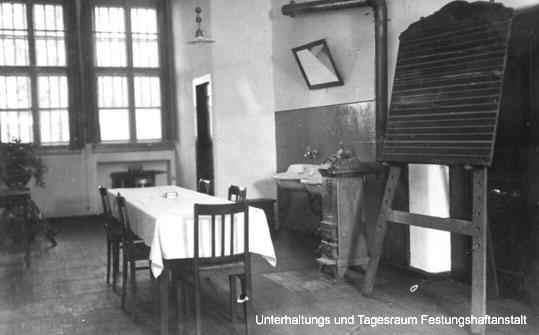
Shortly before twelve o'clock they would spread the cloth for dinner in the common room. This cloth didn't properly come under orders, but the convicts instituted it and we made no demur. They brought the meal in one large vessel and served it to the prisoners. As a rule the meal consisted of but one dish. Everyone waited for Hitler, each standing erect behind his own chair. When the leader appeared there was a cry of "tenshun!"and he strode to the top of the table, and remained standing, until every man in turn came forward with his table-greeting. Then all sat down and fell to. 62
Warder Hemmrich explained how he "supervised" Hitler's visits:
I used to "take" Hitler's visits in a room set apart for the purpose . . . . In the course of so many but so brief interviews Hitler developed an extraordinary terseness and fluidity of expression. It often went severely against the grain to me to bring these to a close. The moment, however, I made a sign that time was up, Hitler broke off, and withdrew . . . .
It was really a wonderful experience to listen to Hitler in face-to-face conversation. I don't know anyone whose personality was so overwhelming. As a rule when I had to "take" one of these visits, I made a point of having a newspaper on hand, in which for appearances" sake I could appear to immerse myself. Very often, though, I just used it to screen the intense interest I myself was feeling in the conversation.
Hitler's way of putting things was not mere talking: he made you feel the point come right home: you yourself experienced every word . . . . throughout his whole ten months [including pretrial confinement], Hitler never talked to us officers directly on the subject. Yet I don't think I should be off the mark if I were to say that before we saw the last of him everyone here, from the Governor to the furnace man, had become a convinced believer in his ideas. 63
The idea of writing Mein Kampf is variously attributed to Gregor Strasser (by his unreliable brother, Otto), or Max Amann, which is the more likely source. Hitler's initial, working title is "Four and a Half Years of Struggle against Lies, Stupidity and Cowardice" (Viereinhalb Jahre (des Kampfes) gegen Lüge, Dummheit und Feigheit). However, Amann will suggest Mein Kampf (My Struggle), which is a great improvement. 68
Hitler possessed neither a talent for writing nor the capacity for the hard work required to write a decent book, but he could speak convincingly. Given these limitations, the only viable method Hitler could utilize to express his "mythopoeia cum political philosophy" (as Michael Burleigh put it) in text was to dictate long passages as if he were addressing a crowd at the Bürgerbräukeller. The initial chapters are taken down by brawler and chauffeur Emil Maurice, who will be replaced by Rudolf Hess by July. Franz Hemmrich said, "As he finished one section of the book after another he would read it aloud to the others in their evening assemblies." The chapters are then edited and punched-up by the likes of Amann, Mueller, Hess, and Hanfstaengl, none of whom could be mistaken for scholars. Two journalists, a music critic named Stolzing-Cerny, and Hieronymite Father Bernard Stempfle, a former newspaper editor, rearrange and edit entire sections, attempting to give some sort of logical narrative flow to this hodgepodge of obfuscatory Hitlerisms. 69
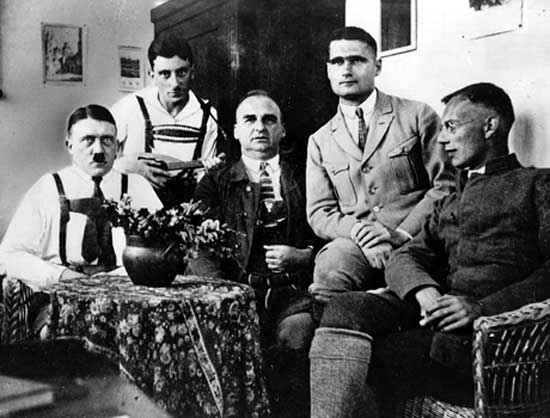
Adolf Hitler, Emile Maurice, Hermann Kriebel, Rudolf Hess and Friedrich Weber
Hitler was always an avid reader, and his time in Landsberg gave him many hours in which to indulge. He would later remark: "At the beginning of our movement, I acted above all by intuition. During my imprisonment I had time to provide my philosophy with a natural, historical foundation. From their own point of view, the rulers of the day made a miscalculation in locking me up. They would have been far wiser to let me make speeches all the time, without giving me any respite!" 70
The various groups quarreled internally and with each other. Nor were their antagonisms private scandals—enemies clawed each other in public regardless both of the spectacle they were giving the shocked onlookers and of the damage they were doing to themselves.
Ludecke visits Hitler at Landsberg:
"From now on," he [Hitler] said, "we must follow a new line of action. It is best to attempt no large reorganization until I am freed, which may be a matter of months rather than of years."
I must have looked at him somewhat incredulously.
"Oh, yes," he continued, "I am not going to stay here much longer. When I resume active work it will be necessary to pursue a new policy. Instead of working to achieve power by an armed coup, we shall have to hold our noses and enter the Reichstag against the Catholic and Marxist deputies. If outvoting them takes longer than outshooting them, at least the results will be guaranteed by their own constitution! . . . .
Any lawful process is slow. But already, as you know, we have thirty-two Reichstag deputies under this new program . . . . Sooner or later we shall have a majority—and after that, Germany. I am convinced this is our best line of action, now that conditions in the country have changed so radically . . . . it is best to attempt no large reorganization until I am freed. I don't want anyone to have the opportunity to replace me while I am locked up here." 71
The ascendancy he gained over the officials and guards at Landsberg was quite extraordinary. The jailers even used to say "Heil Hitler" when they came into his cell. This was partly due to the extraordinary magnetism of his personality, and to his political martyrdom, which found a wide acclaim across many and varied sections of the community. He received favored treatment, which included freedom to accept gifts of food from outside, and this again gave him a further hold over his warders. It was very easy to say "Take this box of chocolates home to your wife" when he had almost unlimited quantities available. He and Hess had not so much cells as a small suite of rooms forming an apartment.
The place looked like a delicatessen store. You could have opened up a flower and fruit and wine shop with all the stuff stacked there. People were sending presents from all over Germany and Hitler had grown visibly fatter on the proceeds . . . .
"You really must take part in some of the gymnastic exercises and prison sports," I told him.
"No," he said, and the reply was very typical of his mentality. "I keep away from them. It would be bad for discipline if I took part in physical training. A leader cannot afford to be beaten at games." 73
For the time being he [Hitler] has withdrawn himself publicly from the leadership [of the party]. The reason is that he does not want to assume the responsibility for what happens outside without his knowledge, and possibly against his better judgment. Nor is he able to smooth out the constant quarrels, at least not from here. He considers it unnecessary to bother with such petty disagreements. On the other hand, he is convinced that once he obtains his freedom, he can steer everything back on the right track. 78
1924 July Catholic politician Heinrich Held becomes the Minister President of Bavaria following the resignation of Eugen Ritter von Knilling. Held follows a policy of reconciliation with Berlin, and suppresses all calls for secession. He will remain in power in Bavaria, in one capacity or another, until the Nazi takeover in 1933. 79Yes, yes, it is quite correct that I have changed my opinion concerning the methods of fighting Jewry. I have come to the realization that I have been far too soft up to now! While working on my book, I have finally come to realize that the harshest methods of fighting must be employed in the future if we are to win. I am convinced that this is not only a matter of life and death for our people but for all peoples. The Jew is a world pest. 80
1924 August 15-17 A conference in Weimar proclaims the organizational merger of the NSDAP and DVFP into the National Socialist Freedom Movement (Nationalsozialistische Freiheitsbewegung, or NSFB). Hitler continues to remain silent publicly, though a letter from "your leader Adolf Hitler" was read to the assembled delegates to great applause. 81It is my rock solid conviction that Hitler will not move one iota from his National Socialist thinking . . . And if it nonetheless sometimes looks as if that is the case, then it is only for the sake of more important goals. For he combines in himself the pragmatist and the politician. He knows his goal, but also sees the ways to accomplish it. My stay here has strengthened what I still doubted in Goettingen: the faith in Hitler's political instinct. 82
1924 September 15 From a report by the governor of Landsberg prison, Oberregierungsrat Otto Leybold:
Hitler shows himself to be a man of order, of discipline, not only with regard to his own person, but also towards his fellow internees. He is contented, modest, and accommodating. He makes no demands, is quiet, and reasonable, serious and without any abusiveness, scrupulously concerned to obey the confinements of the sentence. He is a man without personal vanity, is content with the catering of the institution, does not smoke or drink, and, despite all comradeliness [sic], knows how to command a certain authority with his fellow inmates . . . .
He is not drawn to the female sex. He meets women with whom he comes into contact on visits here with great politeness without becoming engaged with them in serious political discussions. He is always polite and never insulting towards the officials of the institution. Hitler, who at the beginning had a great number of visitors, has kept for some months, as is well known, as far as possible from political visits, and writes only few letters, mainly notes of thanks. He occupies himself every day for many hours with the draft of his book, which should appear in the next weeks and will contain his autobiography, thoughts on the bourgeoisie, Jewry and Marxism, German revolution and Bolshevism, on the National Socialist Movement and the prehistory of the 8th of November 1923 . . . .
He proposes to re-found and reanimate his movement, but in the future he proposes not to run counter to the authorities . . . .
During the ten months of his remand and sentence he has without doubt become more mature and quiet than he had been. He will not return to liberty with threats and thoughts of revenge against those in public office who oppose him and frustrated his plans in November 1923. He will be no agitator against the government, no enemy of other parties with a nationalist leaning. He emphasizes how convinced he is that a state cannot exist without firm internal order and firm government. 83
Hitler's influence on all those of a Völkisch mind—he is today more than ever the soul of the whole movement—will not only stop the regressive development of the Völkisch movement, but will unite the currently fragmented parts and lead great masses of those supporters of his idea, who have already fallen off and are still detached, back to the NSDAP. 86
Munich's District One state prosecutor, Ludwig Stenglein, has also written to the parole board, recommending that Hitler serve his full sentence and then be deported to Austria. Both Tenner and Stenglein point out that beside the fatalities of the actual shooting, the putsch had involved random acts of violence, kidnapping, and bank robbery. Even during his imprisonment, letters written by Hitler were discovered being smuggled out of the prison. These letters, as well as the discovery, on September 16, of conspiratorial documents in the hands of the Frontbann, a successor organization to the NSDAP, suggest that Hitler is still engaged in revolutionary behavior. If he must be released, the two prosecutors argue, it is preferable that he immediately be deported, as he is a menace to public safety. These protests, along with many others, are ignored by the parole board, which approves Hitler's parole, initially set for October 1. 87
It was a queer experience when the Mufti of the prison came to tell me, with all sorts of circumlocution, and panting with emotion: "You're free!" I couldn't believe it was true. I'd been sentenced to six years!
I owe my liberation to the juryman Hermann, a scowling, supercilious man, who throughout the trial had looked at me with a grim expression. I supposed him to be a member of the Bavarian People's Party, reflecting that the Government had doubtless appointed jurymen to suit it.
Through Hermann I learnt the details of my trial. The jury wanted to acquit them. On the evidence of my defense, they were convinced that Kahr, Lossow and Seisser must have been equally guilty. They were informed of the objection that an acquittal might entail the risk of having the affair referred to the Court at Leipzig. This made the jury reflect. They decided it was prudent to have me found guilty, the more so as they had been promised a remission of the sentence after six months. This had been a little piece of knavery on the Court's part, for they had no reason to suppose that an appeal by the public prosecutor could have resulted in the case being referred to the Supreme Court. In fact it's certain that Kahr, Lossow and Seisser would not have appeared at Leipzig. Since the promise of conditional liberation was not kept, Hermann wrote to the Government informing it that the three jurymen would appeal to public opinion if I were not set free immediately.
When I left Landsberg, everybody wept (the Mufti and the other members of the prison staff)—but not I! We'd won them all to our cause. 94
Adolf Müller, the proprietor of the Munich Publishing House [and printer of Nazi publications], came to see me. "Would you like to come on a little picnic with me," he asked, "to Landsberg?" I understood, of course, that he was going to visit Hitler. To be on the safe side, I took my camera with me. One never knows one's luck.
I was surprised to see that Müller did not take his chauffeur with him, but drove his big Daimler-Benz himself. As we settled in the car, he told me that he was going to fetch Hitler! "Very few people," he added, "know the exact date and time at which he will be released.. . ."
Very soon the big Daimler-Benz drew up outside Landsberg Fortress. I got out and prepared my camera. Then I heard a grinding noise—the gates were being opened. The historic moment, apparently, was upon us! But in reality, it was not! It was only the uniformed gatekeeper, who drew my attention to the fact that all photography was forbidden. I retorted that he was exceeding his authority, which did not stretch beyond the confines of the fortress itself; to which he replied quite calmly that if I ignored his warning, he would confiscate my camera . . . .
I demanded to see the Director [governor]. The Director was friendly, but quite firm. "Instructions from the government," he said. "Hitler is not to be photographed as he leaves the fortress." And that was that.
With a terse greeting, [Hitler] stepped swiftly into the car, and we drove off . . . . It seemed to me essential that a photograph to mark the occasion should be taken in Landsberg itself; and if that were not possible in front of the fortress, then I must take one elsewhere. I suggested that we stop by the old city gates, where we would still retain something of the fortress atmosphere. To this Hitler agreed, and I took several pictures.
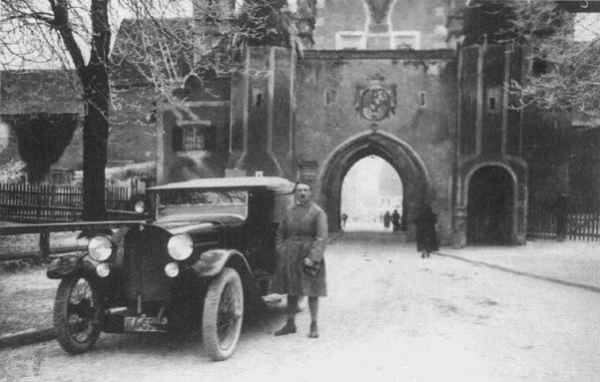
The same day, I sent the photographs to all the various home and foreign newspapers, with the caption "Adolf Hitler leaves Landsberg Fortress." As I anticipated, the picture was published all over the world. But when I received my copies, I could not help laughing. Not a single newspaper had used my caption. Instead: "The first step to freedom" — "The Fortress Gate has opened" — "On to new deeds" — "Thoughtfully, Hitler stands in front of his prison — what will he do now?"
What Hitler actually did was to say to me: "Get a move on, Hoffmann, or we'll have a crowd collecting; and anyway, it's bloody cold!"
We returned to the car, and I asked him what he intended to do next. "I shall start again from the beginning," he said decisively. "The first thing I want is office space. Do you know of anything in that line, Hoffmann?"
I told him that at 50 Schellingstrasse there were thirteen empty rooms to let. "That's fine!" he answered gleefully. "I'll take twelve of them." Hitler, among other things, was very superstitious. 97
My thirteen months of imprisonment had seemed a long time—the more so because I thought I'd be there for six years.
I was possessed by a frenzy of liberty. But, without my imprisonment, Mein Kampf would not have been written. That period gave me the chance of deepening various notions for which I then had only an instinctive feeling. It was during this incarceration, too, that I acquired that fearless faith, that optimism, that confidence in our destiny, which nothing could shake thereafter.
It's from this time, too, that my conviction dates—a thing that many of my supporters never understood—that we could no longer win power by force. The State had had time to consolidate itself, and it had the weapons. My weakness, in 1923, was to depend on too many people who were not ours.
I'd warned Hess that it would take us two years to give the Party a solid foundation—and, after that, the seizure of power would only be a matter of five to ten years. It was in accordance with these predictions that I organized my work. 99
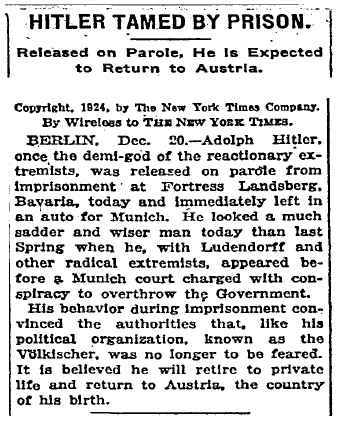



Written by Walther Johann von Löpp Copyright © 2011-2016 All Rights Reserved Edited by Levi Bookin — Copy Editor European History and Jewish Studies

Twitter: @3rdReichStudies



Disclaimer: The Propagander!™ includes diverse and controversial materials--such as excerpts from the writings of racists and anti-Semites--so that its readers can learn the nature and extent of hate and anti-Semitic discourse. It is our sincere belief that only the informed citizen can prevail over the ignorance of Racialist "thought." Far from approving these writings, The Propagander!™ condemns racism in all of its forms and manifestations.
Fair Use Notice: The Propagander!™may contain copyrighted material the use of which has not always been specifically authorized by the copyright owner. We are making such material available in our efforts to advance understanding of historical, political, human rights, economic, democracy, scientific, environmental, and social justice issues, etc. We believe this constitutes a "fair use" of any such copyrighted material as provided for in section 107 of the US Copyright Law. In accordance with Title 17 U.S.C. Section 107, the material on this site is distributed without profit to those who have expressed a prior interest in receiving the included information for research and educational purposes. If you wish to use copyrighted material from this site for purposes of your own that go beyond 'fair use', you must obtain permission from the copyright owner.